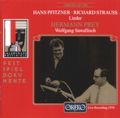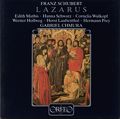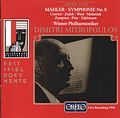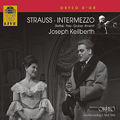ORFEO International
News
July 2009
Hermann Prey's Eightieth Birthday
It has been claimed that in the age of film and television popularity and seriousness in classical music, especially in opera, are mutually exclusive. The German baritone Hermann Prey was living refutation of this claim. In Germany, at least, he was seen as the epitome of the down-to-earth artist who always retained an underlying seriousness of purpose. 
Hermann Prey
Foto: GrasserEven when he sang folksongs and numbers from musicals, few listeners would have considered him an example of a “crossover” act in the modern sense of the term. With a vocal style of performance that seemed altogether natural and honest, Prey, who would have been eighty on 11 July 2009, never seemed to cross stylistic barriers or to reduce whatever he was performing to its lowest common denominator: whether the work that he was singing was comic or sad, whether it involved the sense of distance of a third-person narrator or demanded first-hand emotional intensity, it was always the music’s expression that was the key to his performance. 
C 116 842 H
C 524 991 B
C 011 101 A
C 344 932 IThroughout his life, Prey’s great model was Heinrich Schlusnus, an inspirational figure who enabled him to build up his lieder repertory with the same care and variety as he did with each of his operatic roles and who prevented him from venturing too far into the field of drama with his essentially lyric baritone. It was no doubt not least as a result of this careful husbandry of his resources that he was still able to appear at the Munich Opera Festival only a few days before his sudden death in 1998. 
C 345 953 D
C 519 992 B
C 765 082 IStill in excellent vocal health, he was even scheduled to sing one of his signature roles, Beckmesser in Wagner’s Die Meistersinger von Nürnberg, at the end of the Festival. Fifteen years earlier, when he was already in his mid-fifties, he had taken the part of the municipal governor, Friedrich, in Wagner’s early opera, Das Liebesverbot, also at the Bavarian State Opera in a production conducted by Wolfgang Sawallisch. It was one of his most brilliant assumptions and may be heard on the Orfeo label, as may Prey’s work as a lieder recitalist with Sawallisch as his accompanist, this time in the form of a recital from the 1970 Salzburg Festival featuring lieder by Pfitzner and Richard Strauss. Strauss is also represented by his opera Intermezzo: as its protagonist (and as Strauss’s alter ego), Prey appeared to great acclaim in performances stretching over a period of twenty-five years. His incarnation of the role of the conductor Robert Storch may be heard in a 1963 performance from the Vienna State Opera under Joseph Keilberth, the youthful élan that he and Hanny Steffek as Storch’s wife Christine brought to their roles proving positively infectious. His legendary partnership with Fritz Wunderlich may be sampled in his recording of Verdi’s La traviata from the Bavarian State Opera, while his recording of Brahms’s song cycle Die schöne Magelone, made in the Vienna Musikverein in 1983 with his daughter, the actress Annette Prey, as the narrator and with Helmut Deutsch as his accompanist, is very much a family affair. It is thanks to his family, moreover, that much of Prey’s life’s work, including the Bad Urach Autumn Festival of which he was the artistic director, survives to the present day, over and above our memories of this great artist, memories that a grateful Orfeo hopes it may help to keep alive.
top |